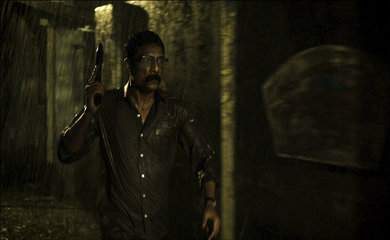“Der Nactmahr’s” early swimming pool set piece exerts an audacious ear drubbing of sub-bass pressure, a sonic bombardment of ultra-sleek techno that threatens to strobe the viewer out of their very existence. 17-year old student Tina and her upper-middle class pals are thrown around like particles inside The Hadron Collider as their drugs creep up their sweaty backs and pound them into submission. Watching her twin trails of urine crawl into the distance like a warped T-1000 Tina isn’t sure what’s real anymore. Did she spy something in the woods or are her narcotics just a little too close for comfort? Either way Tina is being paid a visit by her sub-conscious or haunted by the ghost of what might have been and we are privy to her darkest nightmares.
Painter/sculptor AKIZ’s debut movie is a warped refashioning of the golem myth, a warning shot across the bow of the liberal German intelligentsia. Tina lives with her parents in an expressionist mansion, crushing angles, contrasting patterns and very dark spaces in which teenage paranoia lurks at every turn. The infernal glow of the 21st century inhabits every corner of Tina’s life. Does the modern day teenager ever truly sleep or are they slaved to the dominion of insomnia as screens wait ever eager to captivate the vibrancy of youth with the empty promises of ready made hedonism? What’s for certain is that “Der Nactmaher” could be an admission of German guilt, the failure of the European dream or a “Rosemary’s Baby” for the I-generation. It could be all of these things or none of them. Does Tina even have a genuine issue or is she just a victim of more First World Problems?
Speaking of late nights, SNL has been up forty years straight on a massive New York City bender and Bao Nguyen’s brisk documentary; “Live From New York” perfectly captures the highs and lows of America’s landmark satire show. The film opens up with screen tests of the original cast, so young and familiar and you’d be forgiven if you thought we were going to walk down a well-travelled road. The tragedies of Belushi, Radner and later on with Farley are well known but Nguyen doesn’t delve into melancholy and skips quickly, but respectfully over their effervescent images.
Where “Live From New York” succeeds is in telling the story of the black and female cast members who struggled with equality and challenged the stereotypical representations on American television. The satire is brought to the fore and most interesting of all examines SNL’s influence on various Presidential races. However Amy Poehler’s observation on the changing face of American media is the most accurate, “It used to be a show that your parents had sex to. Now you watch from your computer during the day.”
The nightmarish, Kafkaesque “Sunrise” is an Indian neo-noir set on the mean streets of Mumbai where daylight is a distant memory for Inspector Joshi. Haunted by the abduction of his six-year-old daughter Aruna, Joshi’s very soul seems trapped in limbo as he fails to navigate the delicate balance between past and present and reality and fantasy. His face is ashen and his miraculous moustache clings to his top lip like the weight of a thousand agonies. Spectres claw across the walls and for one of the most populous cities on earth Joshi seems forever alone, cursed to walk into the Lynchian Paradise Club again and again. When he begins to investigate a sinister child trafficking ring, redemption beckons as he tries to right the wrong done to him and his wife.
Director Partho Sen-Gupta doesn’t let Joshi or the audience off the hook that easily as an overwhelming sense of nihilism compresses the screen. The futility of hope is rinsed out of every frame via Jean-Marc Ferriere’s oppressive cinematography, no where more so then when we are shown Joshi’s home life with his traumatised wife. She is bereft, held silently by her husband as she warps in and out of bleak realisation that her daughter is lost to the darkness of men’s hearts. When we read the legend that over 100,000 children go missing every year no wonder a crowd of young girls cry black tears as they surround Joshi at the height of his vengeance. Just as Joshi is haunted, “Sunrise” haunts us in the audience, too.

